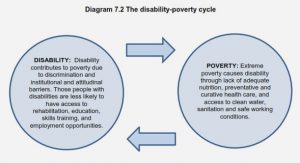Get Complete Project Material File(s) Now! »
Concise overview of problem
One of the challenges faced by ICT4D is that the contribution of ICT to socio-economic development is difficult to describe and assess. ICT‟s contribution to less developed countries is often unclear, according to Bollou (2010: 6): “After over a decade of heavy investment in ICT infrastructure expansion in Africa, little empirical research on the contribution of ICT to development has been conducted to assess the impact of these investments on the development of these countries”. “We do not know exactly how ICT affects national development” (Sein and Harindranath, 2004: 15). Heeks (2010) indicates that ICT4D impact assessment has to date predominantly focused on ICT4D‟s immediate impact, such as providing infrastructure, as opposed to the downstream impact on the socio-economic development of the community at large.
A related problematic notion in ICT4D is that of sustainability. The sustainability that is usually aimed for, is the sustainability of the information system implemented (Jacucci et al., 2006), while the researcher regards this as necessary but not sufficient for the increased sustainability or development of the larger social system.
If one could find a way to describe the larger social system in which ICT is introduced, including its mechanisms and dynamics, then one can start to investigate the impact of a new entrant into the system, namely ICT, on the existing mechanisms. This may be possible through a systems approach, which according to Ackoff (1999) is characterised by its concern for the performance of the total system, even where changes are only made to a part of the system. Systems thinking recognises that the performance of a subsystem relative to its own goals does not necessarily lead to increased performance of the larger system. In ICT4D, there is a need to indicate the effect of a technology intervention on the whole, or containing social system.
A literature search of the use of systems thinking in ICT4D returned very few results, with no results from some of the key ICT4D journals. This is despite Walsham et al.‟s (1988) early call for dealing with the social context of ICT4D as social systems. In the current ICT4D impact assessment frameworks (Heeks and Molla, 2009) there is no explicit use of systems thinking. These findings are perhaps not surprising in the light of the “surprisingly little systems thinking in the IS discipline” overall (Alter, 2004) and since “the IS community has not come to realise the significance” of systems thinking (Lee, 2004). The literature search on systems thinking in ICT4D indicates that systems work in this field is not only limited but also fragmented, not providing a good base from which to conduct further research.
In the discussion above a need is identified for the use of systems thinking in ICT4D, in particular to describe and assess the impact of an ICT4D project on the sustainability and socio-economic development of its containing social system.
CHAPTER 1 INTRODUCTION
1.1 Motivation
1.2 Concise overview of problem .
1.3 Research undertaken .
1.4 Chapter outline.
1.5 Conclusion .
CHAPTER 2 ICT4D BACKGROUND RELEVANT TO PROBLEM STATEMENT
2.1 Introduction
2.2 Key definitions
2.3 Dealing with development and sustainability in an alternative way: introducing systems thinking
2.5 Conclusion
CHAPTER 3 RESEARCH METHODOLOGY
3.1 Introduction
3.2 Research philosophy
3.3 The IS and ICT4D research contexts
3.4 Research strategy
3.5 Using a theory.
3.6 Information collection.
3.7 Information analysis.
3.8 Research audience
3.9 Contribution to knowledge
3.10 Limitations of the study .
3.11 Conclusion .
CHAPTER 4 SYSTEMS THINKING AND SYSTEMS APPROACHES
4.1 Introduction
4.2 Systems thinking: background and overview .
4.3 The various systems approaches
4.4 Hard systems thinking..
4.5 Soft systems thinking.
4.6 Critical systems thinking.
4.7 Complexity thinking
4.8 Postmodern systems thinking
4.9 Multimethodologies
4.10 Conclusion
CHAPTER 5 SOCIAL THEORY BUILDING BLOCKS, AND SELECTING A SOCIAL SYSTEMS THEORY.
5.1 Introduction.
5.2 A mechanical view of society
5.3 Functionalism.
5.4 Other systems contributions in social theory
5.5 Giddens and social systems
5.6 Assessment: systems thinking in social theory
5.7 The challenge of selecting a social systems theory
5.8 Conclusion
CHAPTER 6 AUTOPOIESIS AND ITS SOCIAL APPLICATION.
CHAPTER 7 SOCIAL SYSTEMS FRAMEWORK
CHAPTER 8 CASE STUDY BACKGROUND AND ASSUMPTIONS: A CONTEXTUAL OVERVIEW.
CHAPTER 9 DESCRIPTION OF SOCIAL SYSTEMS
CHAPTER 10 CONCLUSION .
REFERENCES






